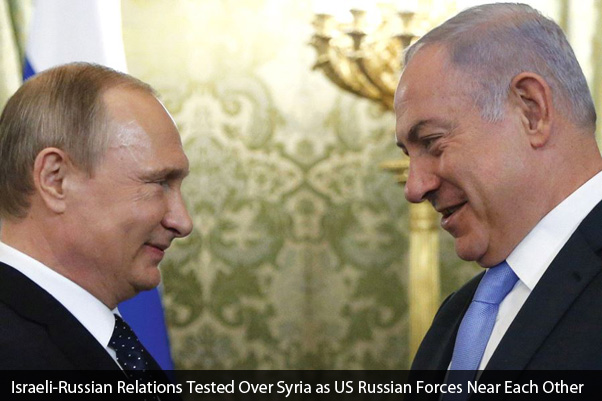AT THE END OF FRIDAY’S ARTICLE, “Are United States and Russia Headed for Cooperation Despite Neocon-Liberal Objections?“, it was concluded that, “The only player in the region with more to lose than Turkey, is Israel…who has benefited from the enormous pounding its enemies have given to each other over recent years – Israel benefits by continued conflict – it does not want peace between the US and Russia nor mutual-agreement over Syria and the Kurds. It remains to be seen what Israel will do in response to possible US-Russian cooperation in the battle over ISIS about to unfold in Raqqa (Syria); will they fight each other or cooperate? Chances are high that they will cooperate, but signs are being genratd that indicate that they might not. Nonetheless, the question remains, “How will Israel respond to unexpected cooperation?” If events that occurred earlier last week are any indication, the Israelis do not like what is unfolding, they have already violated Syrian airspace and fired missiles in Syria just a few days ago. In response, the Syrian military said that
“The Israeli strikes had targeted a military installation near Palymyra (in Syria).”
l
“The incident was highly unusual in that it also saw the Israeli military break its customary silence over raids in Syria to release a statement to admit that its aircraft had been targeted while operating there.”
l
“Overnight, March 17, IAF aircrafts [sic] targeted several targets in Syria”, ‘said the statement.'”
The United States might not be fighting against Syria at the moment but Israeli operations in Syria indicate that the Zionists are apparently engaged in operations against them as well as their ally, Iran who is legally transiting weapons across Syria to Hezbollah soldiers stationed on the Syrian side of the Golan Heights, at least, that is the Israeli version of the story. Professor Eyal Zisser, a Syrian expert who teaches at Tel Aviv University in Israel, discussed an agreement made between Vladimir Putin and PM Netanyahu (June 7, 2015) in which the Russians supposedly gave their word that military equipment being transferred from Iran to Hezbollah is solely for purposes of waging war against ISIS; it would not therefore, be employed in any type of attack on Israel.
Thus, according to the Syrian accounts, Israel targeted Syrian military positions combating ISIS (not weapons being shipped to Hezbollah). Either way, Israel violated international law and the right of Syria to national sovereignty. Do weapons used against Syria transited through Turkey permit Syria to violate Turkish airspace and bomb Turkish infra-structure? The airspace of sovereign nation is supposedly protected by international law.
“According to the set principles governing international law, a state has complete and exclusive sovereignty over the sky above its territory. Without permission, it is absolutely forbidden for foreign military planes to enter the territorial airspace of other states.”
Therefore, the Syrian Foreign Ministry drafted a complaint to the UN in which they stated
l“Syria calls on the UN Secretary General and the President of the UNSC to condemn this blatant Israeli aggression, to force Israel to stop supporting terrorism in Syria, to implement all UNSC resolutions on counter-terrorism, including resolution No. 2253, to withdraw from the whole occupied Syrian Golan to the line of June 4th, 1967, and to implement resolution No. 497 for 1981”
Israel has its own interpretation of events to justify its action: Iran is transferring weapons to Hezbollah to be used against israel. Here is a taste of Israeli justification from its Prime Minister Benjamin Netanyahu who stated that Israel would continue to act militantly to prevent transfer of advanced weapons to Hezbollah:
“Our policy is very consistent: when we identify attempts to transfer advanced weapons to Hezbollah, and we have the intelligence and operational feasibility – we work to prevent this.”
This is an open admission, what appears to be a braggadocio admission, followed by a dose of strained logic:
“That’s how it’s been and that’s how it will be, we have determination, and the proof is that we are acting, and everyone has to take this into account,” he added.
In other words, the morality of the act is to judged by the fact that Israel can get away with it, “the proof is we are acting” and “everyone has to take this into account.” This is not a reasonable or moral justification; it is nothing more than a “might makes right” argument, the rule of the jungle that governs animal interaction; it can only be hoped that this is not how Zionists view gentiles?
“Then they brought Jesus from Caiaphas to the praetorium. It was morning. And they (the Jews) themselves did not enter the praetorium, in order not to be defiled.”
This type if justification might have worked in the past, but more and more people are waking up to the dignity of the human person (all persons); this is a rational that people seeking peace and a two-state solution are growing tired of – being a citizen of Israel does not give anyone any type of hyper-human-status that empowers them to trample on the rights of others.
If this is really representative of Netanyahu’s logic, the Israeli PM is acting hypocritical. Israel would not permit foreign jets to invade their airspace and then annihilate targets without a media blitz fired around the globe amid a veritable storm of moral objections. The PM has just opened the doors to Syrian and Iranian jets flying into to Israel to obliterate what they perceive to be security threats to be used on targets in their own countries or that of their allies.
Apparently, Israel is not averse to violating international law to carry out its objectives, nor was Turkey who is now paying a price for its transgressions. Is Israel about to learn a similar lesson or will they influence the Trump administration to keep up war on Syria once ISIS is obliterated?
“Brig Gen Nitzan Nuriel, a former Director of Counter-Terrorism in the Israeli Prime Minister’s Bureau, said conflict with Hezbollah was inevitable as the group sought ever more advanced anti-aircraft missiles, heavy rockets and tactical weapons, but he believed Assad had seriously misread the situation.”
l
“Assad has not read the map correctly,” he said. “He believes it is only a question of weeks or months before he can declare a full victory and is looking to the next stage. I believe he is mistaken and that clashes in Syria will stay with us for the next three to six years.”
l
“Discussing Russia’s role in Syria, he added more controversially: “Russia got the messages it needs to receive from Israel.” That was, he said: “Israel will not allow anyone, including Russia to get in the way of implementing our military mission.”
This is a former Israeli Brigadier General’s perspective, but others are interpreting and reporting it differently. In fact, after the Israeli attack, the Russian government almost immediately summoned Gary Koren, the Israeli Ambassador, and requested an explanation – something they have not done following previous Israeli violations in Syria). Rather than smooth things over for the Israeli side, Avigdor Lieberman, Israeli Defense Minister, following the Netanyahu line, exacerbated them:
“The next time the Syrians use their air defence systems against our planes we will destroy them without the slightest hesitation.”
As if to say that Israel has a right to annihilate targets in other countries, but these countries somehow act wrongly if they defend themselves as if the Zionists were some type of privleged people and the and the rest of the world is made up of outcasts. Israel has run into a Western nation that will not follow its script. Russia, apparently, will not allow itself be pushed around by the playground bully or be intimidated by empty chutzpah. Contrary to PM Netanyahu and Brig. Gen. Nitzan Nuriel, Dr. Bashar al-Jaafari, Syrian Ambassador to the United Nations, stated that
“Putin sent a clear message,” he said. “The fact is that the Israeli ambassador (to Russia) was summoned for a conversation… and was told categorically that this game is over.”
Jaafari also stated that “Syria will no longer sit by while Israel blatantly attacks its forces“; implying that the response will be greatly amplified if an Israeli attack occurs again.
Russian Foreign Minister Sergei Lavrov, however, took a more pragmatic and realistic approach that moves beyond rhetoric to make decisions based upon actions. After stating that Russia expects Israel to honor agreements made between Putin and Netanyahu during the latter’s state visit to Moscow earlier this month, he stated that Russia
“…will judge (Israel) not by their statements, but by their actions, to what extent our Israeli partners are sticking to these agreements.”
If these type of actions continue, a Russian response can be expected. In this regard, Syrian President Bashar Assad told visiting Russian legislators that Syria is depending on Russia to avert further Israeli attacks and to help Damascus avoid a “full-blown conflict with Tel Aviv”. This does not appear to be something Syria desires and which it is trying to avoid, nor is it something desired by Russia.
At the June 7 meeting (discussed above) between Netanyahu and Putin, host Vladimir Putin concluded:
“Russia and Israel can take pride in our high level of partnership, fruitful cooperation and far-reaching business contacts”
According to the Jerusalem Post,
“Since then, that partnership has continued to grow, but the looming crisis in Syria threatens to upset this dance.”
If the Israelis keep their word and discontinue bombing runs in Syria, the risk of confrontation with Russia will be minimized and most likely become non-existent (at least at this time). What the Jerusalem Post is referring to is the current situation in Syria where both US and Russian troops and their allies are all within a grenade’s distance of each other, each wanting to defeat ISIS, which is now isolated in its Syrian capital, Raqqa. The offensive against this city is slated to begin in a few days; at this moment it is unclear how Russian and American forces will interact in this crucial campaign. Israel is a staunch US ally but has also entered into serious negotiations and agreements with Russia, will they risk their recent gains?
The entire scenario discussed above is contingent upon US and Russian cooperation or conflict in Syria. Will they cooperate to defeat ISIS at Raqqa and to craft a mutual-plan to support the Kurds in Northern Syria and Iraq? If they fail to do so, if the United States or Russia have other plans in Syria, plans that would exacerbate rather than ameliorate American-Russian relations, the entire situation changes from a possible peace scenario to one of increased conflict, as will be discussed tomorrow.








I adore this blog layout . How do you make it. It is rather cool. Have you considered promoting your blog? add it to SEO Directory right now 🙂